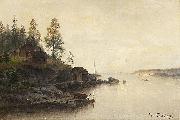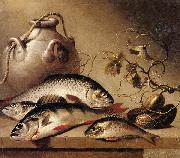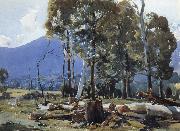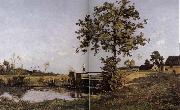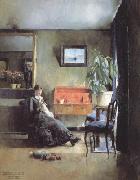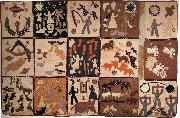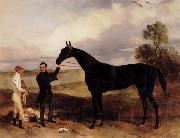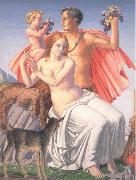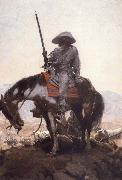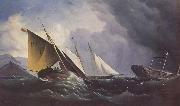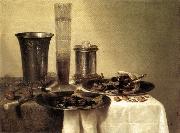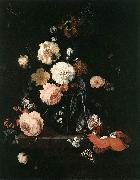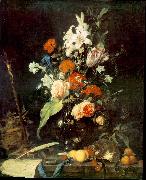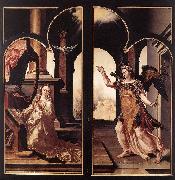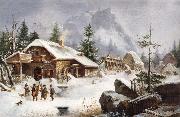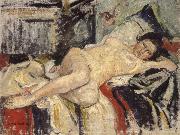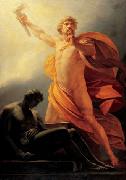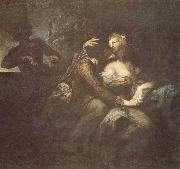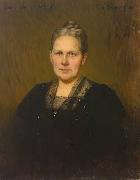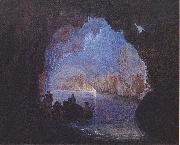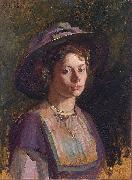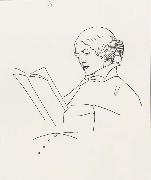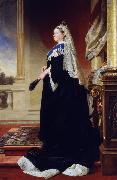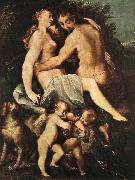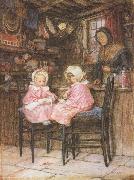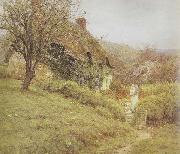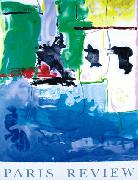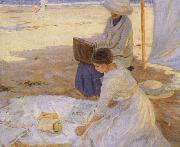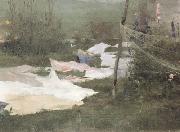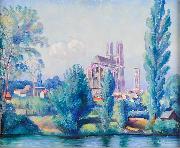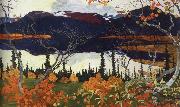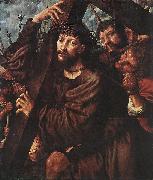|
|
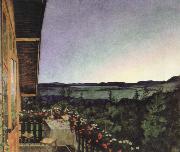 |
Harald Sohlberg
|
|
Harald Oskar Sohlberg (29 September 1869?C19 June 1935) was a Norwegian Neo-romantic painter, particularly known for his depictions of the mountains of Rondane and the town of Røros. His perhaps most well-recognized painting is his 'Fisherman's Cottage' from 1907. |
|
|
|
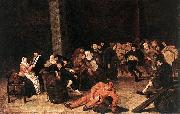 |
Harmen Hals
|
|
Herman, or Harmen Hals (1611, Haarlem - 1669, Haarlem), was a Dutch Golden Age painter.
According to Houbraken he was the son of the painter Frans Hals and was like his brothers Jan and Frans II, good at music and painting. He was a member of the Haarlem Guild of St. Luke.
According to the RKD he was the oldest son of Frans Hals, and spent most of his life in Haarlem, but is registered in Vianen from 1642-45, and in Amsterdam in 1645. |
|
|
|
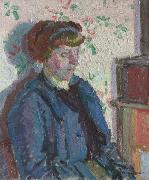 |
Harold Gilman
|
|
(11 February 1876 - 12 February 1919) was a painter of interiors, portraits and landscapes, and a founder-member of the Camden Town Group.
Though born in Rode, Somerset, Gilman spent his early years at Snargate Rectory, in the Romney Marshes in Kent, where his father was the Rector. He was educated in Kent at Abingdon, Rochester and Tonbridge schools, and for one year at Brasenose College in Oxford University.
Although he developed an interest in art during a childhood convalescence period, Gilman did not begin his artistic training until after his non-collegiate year at Oxford University (cut short by ill health) and after working in the Ukraine as a tutor to a British family in Odessa (1895). In 1896 he entered the Hastings School of Art to study painting, but in 1897 transferred to the Slade School of Fine Art in London, where he remained from 1897 to 1901, and where he met Spencer Gore. In 1904 he went to Spain and spent over a year studying Spanish masters (Velezquez and Goya as well as Whistler were major early influences).
At this time he met and married the American painter Grace Cornelia Canedy. The couple settled in London (apart from a visit to her family in Chicago, when Gilman ducked pressure to join the Canedy family business). They had two daughters (one in London, one in Chicago).
|
|
|
|
|
|
|
|
|
|
|
|
|
|
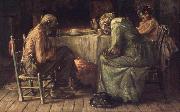 |
Harry Roseland
|
|
(c.1867-1950) was one of the most notable painters of the genre painting school around the turn of the 20th century. An American, Roseland was primarily known for paintings centered on poor African-Americans.
Roseland was largely self-taught, and never traveled to Europe to study art, as did many of the American artists of his time. However, he did receive instruction from John Bernard Whittaker and later, James Carroll Beckwith. One of his most popular subjects were his paintings of black women fortune tellers who read the palms and tea leaves of white women clients. These paintings were widely reproduced during the early 20th century in the form of postcard sets and large full-colour prints that were distributed as Sunday supplements in newspapers. While known most for his paintings of African Americans, his work encompassed many genres, including seascapes and portraits. He also gained renown for his paintings of laborers in the coastal areas of New England and New York and his many interior paintings.
Roseland was born and lived his entire life in Brooklyn. |
|
|
|
|
|
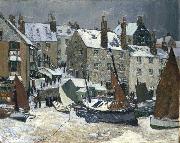 |
Hayley Lever
|
|
(28 September 1876 - 6 December 1958) was an Australian-American painter, etcher, lecturer and art teacher.
Richard Hayley Lever was born in Australia on 28 September 1876. Lever demonstrated artistic talent early on, and spent his entire life focusing on this as his craft. |
|
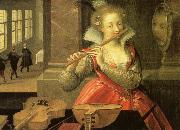 |
hector berlioz
|
|
Period: Romantic (1820-1869)
Country: France
Born: December 11, 1803 in La Cocirc;te-St.-Andre, Isere, France
Died: March 08, 1869 in Paris, France
|
|
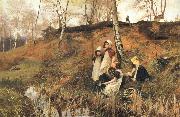 |
Hector Caffieri
|
|
British,the New Water Colour Society which later became the Royal.1847-1832
|
|
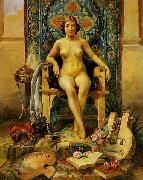 |
Hector Hanoteau
|
|
(25 May 1823 - 7 April 1890, 66) or Hector Charles Auguste Octave Constance Hanoteau was a French landscape painter, born at Decize in Nievre. At the École des Beaux-Arts, he was a pupil of Gignoux, and devoted himself chiefly to landscapes, characterized by sturdy realism and skillful color. He famous works are "The Village Pond," "The Frogs," and "The Water Lilies," all of which are in the Musee du Luxembourg. He is represented also in several French provisional museums. He received a first-class medal at the Paris Exposition of 1889 and the cross of the Legion of Honor in 1870.
|
|
|
|
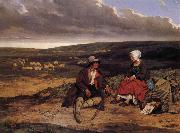 |
Hedouin Pierre
|
|
A fine French painter, etcher and lithographic artist , Boulogne 1820-Paris 1889
|
|
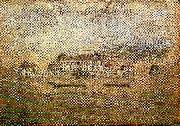 |
hedvig eleonoras
|
|
Hedvig Eleonora av Holstein-Gottorp, född 23 oktober 1636, död 24 november 1715, var svensk drottning och riksföreståndare, dotter till Fredrik III av Holstein-Gottorp och Marie Elisabeth av Sachsen och gift i november 1654 med Karl X Gustav. Hon var med honom i Polen 1656 och i Danmark 1658. Hon var Sveriges drottning i sex år, men de facto "första dam" till sin död 1715, i femtiofem års tid.
Hon blev änka 1660 och levde som änkedrottning i ytterligare 55 år. Kung Karl II av England friade till henne något år efter makens död, men hon tackade nej, med den formella motiveringen att hon önskade vara sin döde make evigt trogen.
Hon satt i förmyndarregeringarna för både sin son Karl XI och sin sonson Karl XII, 1660-1672 samt 1697, och sedan i rådet 1700-1713, men hade i verkligheten aldrig så mycket att göra med politik, utan var nöjd med att formellt presidera över regeringen och hovet som monarkins symboliska överhuvud och representant. Hon stödde dock den profranska och antidanska policy som fördes av regenterna. Hennes son var djupt beroende av henne i hela sitt liv; då han blev gammal nog att sitta med vid regeringens sammanträden, talade han inte direkt till ledamöterna, han viskade i stället vad han ville veta till riksänkedrottningen, och Hedvig Eleonora frågade sedan regeringen med hög röst vad han ville veta.
Då sorgeperioden formellt bröts år 1663 var hon värdinna för omfattande festligheter, och det var i hennes namn Sveriges första fasta teater öppnades i Stora Bollhuset och Lejonkulan 1667.
Hedvig Eleonora, "Riksänkedrottningen", hade en dominant och temperamentsfull personlighet och dominerade det svenska hovet totalt fram till sin död. Även efter sin sons giftermål 1680 och fram till sin död 1715 var hon den verkliga drottningen och behöll sin position som "första dam"; sonen kallade henne "drottningen" och sin fru för "min fru". Under stora nordiska kriget var hon 1700-13 representant för kungen, men intresserade sig inte heller nu mycket för politik- vid audienser för utländska sändebud kunde antingen "moltiga" eller gapskratta åt dem. Hon intresserade sig för kortspel och arkitektur. Hon kunde spela kort till inpå småtimmarna. Drottningholms slott samt Strömsholms slott påbörjades av henne. Vid båda slotten lät hon anlägga stora parker i tidens stil. |
|
|
|
|
|
|
|
|
|
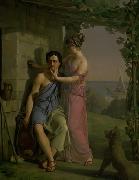 |
Heinrich Eddelien
|
|
Matthias Heinrich Elias Eddelien (22 Januar 1802 in Greifswald - 24 December 1852 in Stuer) was a Danish history painter of German origin. Eddelien arrived in Copenhagen as a young man and attended the Royal Danish Academy of Fine Arts from 1821 studying under Christoffer Wilhelm Eckersberg. In 1837, he was awarded the Academy's large gold medal. From 1839 to 1843, he travelled to Italy and Germany to widen his studies. He painted portraits, altarpieces and decorative works, including the Pompeian Apartment in Christian VIII's Palace at Amalienborg Palace. His principal work is the decoration of Christian IV's Chapel in Roskilde Cathedral but this led to the laming of his right arm. He died when receiving spa treatment at Stuer. |
|
|
|
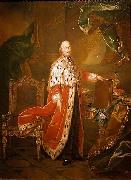 |
Heinrich Foelix
|
|
painted Kurfurst Clemens Wenzeslaus von Sachsen in ca. 1776 |
|
|
|
|
|
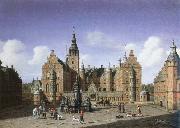 |
heinrich hansen
|
|
Heinrich Hansen (13 October 1861 ?C 17 April 1940) was a German Lutheran theologian and the father of the Lutheran High Church movement in Germany.
Hansen was born in Klockries near Lindholm (Nordfriesland) as a son of a teacher. In Kiel and Erlangen he studied theology, Hebrew, Syriac, Arabic and in particular the Old Testament under August Klostermann. He worked since 1887 as a pastor in Schleswig-Holstein: in Reinfeld, Lindholm, on the island Pellworm, in Kropp and in Olderup near Husum.
Hansen wrote Latin hymns and worked on a Low German Bible translation and published a Low German hymnal. By the study of the old Lutheran theologians, particularly Martin Chemnitz, and the Roman Catholic theologian Johann Adam Möhler, he came to an Evangelical Catholic view about church. In the Reformation jubilee year of 1917??exactly 100 years after Claus Harms?? Hansen published 95 theses (Stimuli et Clavi) in Latin and German, as a sharp criticism against contemporary Protestantism. His theses influenced the foundation of "Hochkirchliche Vereinigung" in October 1918. Hansen is well-known as a co-founder and the first chairman of Hochkirchliche Vereinigung. He died in Breklum
|
|
|
|
|
|
|
|
|
|
|
|
|
|
|
|
|
|
|
|
|
|
|
|
|
|
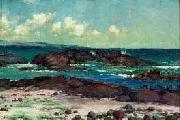 |
Helen Thomas Dranga
|
|
Helen Thomas Dranga (1866-1940), who is also known as Carrie Helen Dranga, was a painter who was born Carrie Helen Tufts in Oxford, England. She lived in Oakland, California from 1894 until 1900, when she moved to Hilo, Hawaii. Her paintings regularly appeared on the cover of Paradise of the Pacific magazine in the 1920s and 1930s. She lived in Hilo until shortly before her death in 1940.
The Honolulu Academy of Arts and the Lyman House Memorial Museum (Hilo, Hawaii) are among the public collections holding works by Helen Thomas Dranga
|
|
|
|
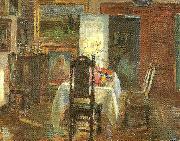 |
helga ancher
|
|
född 19 augusti 1883 i Skagen, död 18 mars 1964 i Skagen, var en dansk konstnär (målare).
Helga Ancher var dotter till konstnärerna Anna och Michael Ancher och förekommer som barn ofta som motiv i föräldrarnas målningar. Helga kom sedermera själv att utbilda sig till målare och studerade bland annat på Konstakademien i Köpenhamn samt i Tyskland, Frankrike och Italien. Även om hon aldrig blev blev lika känd för sin konst som sina föräldrar har en del av hennes tavlor kommit att betinga höga värden på auktioner.
Föräldrarnas hem i Skagen lät Helga Ancher efter moderns död 1935 bevara i det skick det hade då och skänkte sedermera detta till en stiftelse, vilken 1967 kunde öppna konstnärsbostaden som museum. |
|
|
|
|
|
|
|
|
|








